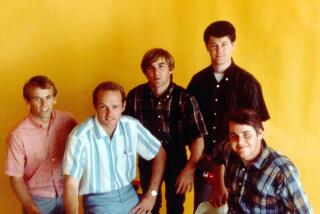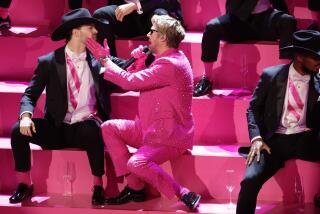‘Brian’s Song’ Remake Goes Flat
Maybe I missed something amid the five Emmy Award acceptance speeches, or the audible sobbing of grown men in front of their televisions, or the jet-fuel ignition of two young acting careers heading for higher altitude.
Because after the country took its first look at “Brian’s Song,” in its original incarnation 30 years ago, I don’t recall anyone saying, “How about a do-over?”
What, Billy Dee Williams as Gale Sayers didn’t quite nail that speech at the awards banquet?
James Caan as Brian Piccolo wasn’t engaging enough, funny enough, poignant enough for you?
And what about that theme music by Michel Legrand? Sure, it’s a heart-tugger. Eyes start welling up within the first few bars. Still, can’t build much of a Top 40 soundtrack around it, can you?
Tonight, ABC and “The Wonderful World of Disney” offer up a remade version of “Brian’s Song” because ... let’s see here ... the producers say the original was too short, the female characters were slighted the first time and many young viewers today have never seen “Brian’s Song.”
Suggestion: They can rent the video.
Suggestion, do-over: Just air the original. Follow it up with interviews with Sayers and Piccolo’s wife, Joy Piccolo O’Connell, and maybe Caan and Williams, looking back on the making of the movie, as they do on the DVD version.
Except, this is Disney taking on “Brian’s Song,” and you can see the inherent problems with that coupling 100 yards away.
The original “Brian’s Song” could never break into the lineup in Disney’s wonderful world because it is a product of its time--i.e., pre-P.C. by a good two decades--and features some coarse and/or racially insensitive dialog that would never make it past the save-us-from-ourselves censors. Even though the very point of including that dialog in 1971 was to underscore how the friendship between the athletes, one black, the other white, transcended social barriers.
In fact, history gets a rewrite in the remake, sanitizing one famous scene from the original, an exchange that was also included in Sayers’ 1970 autobiography, “I Am Third.”
In the scene, Piccolo is in a hospital bed after cancer surgery, on the phone with Sayers after hearing Sayers had given him a pint of blood.
In the book and in the original, Piccolo breaks up Sayers by telling him that explains “this craving I’ve had all day for chitlins.”
In the remake, Piccolo tells Sayers, “That explains why the cancer is gone and now my knee is screwed up.”
See, a couple of years earlier, Sayers injures his knee, and a good portion of the movie is devoted to how Piccolo helps in his rehabilitation, and that’s a very long way to go for a not very funny joke.
Completely stricken from the remake is the scene in which the rehabbing Sayers is on his basement leg weight machine, balking at Piccolo’s insistence he finish the last few reps. The wheels in Piccolo’s head start grinding. He splutters out a racial slur, thinking it will anger Sayers and motivate him enough to finish the set.
By this stage in the movie, it is well established that Sayers and Piccolo are close friends. Sayers hears the slur and can’t believe his ears. What? That’s the best you can do? Sayers begins laughing hysterically, incredulously. Piccolo starts laughing, too. They raise such a ruckus that Sayers’ wife comes halfway down the staircase to find out what the noise is about.
It’s a funny scene, and a telling one--illustrating the depth of a friendship that began as a Chicago Bears’ social experiment, when Sayers and Piccolo became the team’s first interracial roommates in the 1960s.
Thirty years later, this is artistic progress: The scene doesn’t make the cut.
Something else is missing in Version 2.0, and it’s fairly important: The reason why Sayers and Piccolo became friends in the first place.
Sayers, as played this time by Mekhi Phifer, is not simply a shy, tongue-tied rookie when he first meets Piccolo. No, he’s arrogant and aloof and “uppity,” to borrow the word used by Sean Maher’s Piccolo, who makes sure to point out to Sayers (and the audience) that he doesn’t really know what “uppity” means.
Sayers eventually warms to Piccolo because, as Caan plays the character, how could you not? Caan’s Piccolo is wisecracking, mischievous, self-effacing, good company to keep over a six-pack and pizza. But that obnoxious, overgrown frat boy played by Maher? No wonder Sayers keeps his distance for the first half-hour.
Rounding out the cast for this thankless task is Ben Gazzara as Bear Coach George Halas, no match for the original’s Jack Warden. Legrand’s memorable theme music is reprised, but only in snippets, drowned out by a blaring classic oldies rotation of Motown soul hits and Jimi Hendrix. Even the football scenes, most of them actual NFL footage in the original, pale in comparison. Phifer looks like he’s tip-toeing through a rose garden on the sweep that results in Sayers’ torn knee ligaments.
If there hadn’t been a “Brian’s Song” 30 years earlier, and it hadn’t been regarded a genre classic, tonight’s presentation would be easy enough to shrug off as inoffensive and informative, delivering its own lump in the throat at the end.
But the producers should have realized the pointlessness of their venture as soon as they got down to casting the extras.
In the remake, an actor named Jeff Troni plays Dick Butkus.
In the first version, Dick Butkus plays Dick Butkus.
When the original is available, why settle for anything but?
More to Read
The complete guide to home viewing
Get Screen Gab for everything about the TV shows and streaming movies everyone’s talking about.
You may occasionally receive promotional content from the Los Angeles Times.






